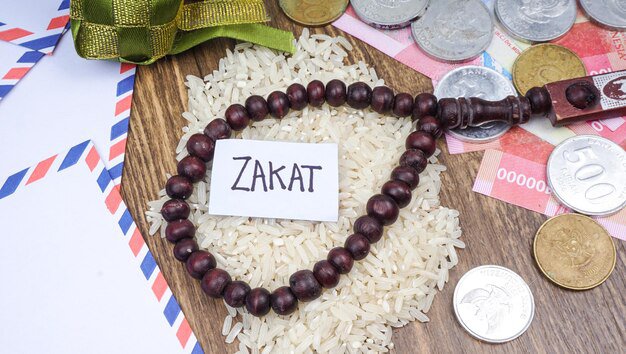the Islamic fiscal system and the role of zakah in Islamic society

Fiscal System of Islam
The word ‘religion’ is applicable, in modern terminology, to a set of beliefs, some moral instructions, a few manners of worshipping and certain customs and traditions to be followed by the individuals in their private life.
This narrow concept of religion has emerged only after the scientific and industrial revolution that started in Europe in the middle of the 18th century.
Sources of Revenues of an Islamic State
Zakah and Usher constituted the major part of revenues in the early Islamic States during the Pious Caliphate and afterwards for centuries.
It can still play a significant role in the fiscal system of modern Islamic economies if implemented properly.
It is appropriate to discuss its implications separately due to its importance.
In addition, the following sources of tax and non-tax revenues contributed to the exchequer (Bait-ul-Mal) of the early Islamic States.
These are still prevailing under the same or different titles in modern societies.
In contrast, Islam is a complete system that carries a specific outlook about human life and suggests the governing principles on all aspects of moral, social, political and economic attitudes.
The way in which a ‘State’ collects resources from the economy and allocates these to various ends is called its fiscal system.
We discuss important features of the fiscal system of an Islamic State in the following lines. Zakah is the most essential ingredient of the Islamic economic system.
Tax Revenues in islamic fiscal system
The following direct and indirect taxes remained enforced in addition to Zakah.
Land Revenues (Kharaj-ul-Aradhi)
The tax levied on the produce of cultivable lands under occupation of the non-Muslims was termed as Kharaj.
During the period of Pious Caliphate and afterwards, vast areas of Syria, Iraq, Egypt, Ethiopia, Spain, Turkey, Central Asia, and India etc. fell under Islamic domination.
A tax was to be levied on the lands thus settled keeping in view the surface area and fertility of the individual tract.
The rate was thus flexible between 20% to 50% of the yield.
Kharaj is comparable to Usher so far as the base, rates and economic effects are concerned.
Both the taxes are chargeable to the agricultural produce, keeping in view the taxable capacity of the payers, and their rates are very close and parallel.
The difference lies in the title of ownership (or usufruct) of the cultivated lands.
Where Usher is applicable to the lands of Muslims, Kharaj is admissible to the case of non-Muslim occupants.
Further, Usher is a component of Zakah system and it can be spent only on pre-specified heads.
There is no such restriction on allocation of Kharaj, in which case the revenues are credited or transferred to the treasury and disposed off in routine for the general welfare of the society.
Continues…
Thus the imposition of Kharaj on the non-Muslim occupants during the Islamic regime was not a specific and novel thing to be worried about.
Later on, when most of these owners embraced Islam, not only Kharaj was lifted and their lands were declared as Ushri, i.e. liable to Usher, but their ownership titles also reinstated.
Jizya in islamic fiscal system:
It is the personal income/wealth tax and admissible to the non-Muslim citizen of an Islamic State.
The tax draws its origin from the Holy Qura’n and Sunnah and it is strictly in line with the benefit approach to taxation expounded by the social and economic philosophers.
The Islamic State is obliged to safeguard the lives and properties of its non-Muslim citizens in the same fashion and with an equal zeal with which it protects the Muslims.
Therefore, the name Dhimmi (under protection) is applied to this category of people.
The imposition of poll tax does not imply that non-Muslims are citizens of some inferior degree and rating.
In contrast, they can equally benefit from the public services and enjoy all the social rights like Muslims including the freedom of religion, traditions and worshipping.
However, they are exempt from compulsory defence services in case of emergencies.
Where the non-Muslims are required to pay only this tax, the Muslim citizens have not only to pay Zakah but also obliged to offer their services for national defence, if necessary.
In simple words, Jizya is the counterpart of Zakah in the Islamic system as Kharaj stands in parallel to Usher.
The rate of poll tax is not statutorily given or fixed like that of Zakah.
There were different rates admissible from time to time, keeping due regard of the taxable capacity of the payer, ranging between 12 to 48 darahim (Dirham was the silver coin containing approximately 3.065 grams of metal) per capita per annum from low to high-income groups.
Custom Duties (Ushur):
Custom duties in the form of octorois and toll taxes were imposed on the imported goods during the early Islamic regimes on reciprocal basis, i.e. in reaction to the behaviour of the then Roman and Persian Empires, who used to charge tolls from the Muslim traders.
The exemption limit and rate structure was similar to Zakah and Usher (2.5%, 5% or 10% maximum of the total value), hence the name Ushur.
Non-Tax Revenues in islamic fiscal system
The following non-tax items constituted part of the revenues of the Islamic States in the past. These are still contributing a lot to the exchequer in one form or the other.
Royalties and Rent from State Properties:
Some of the properties, particularly terraces of the cultivable lands, came under the State occupation as a result of treaties and peaceful surrender of the owners.
The usufruct rights of these lands were entrusted to the former occupants whereas the ownership title transferred to the State.
The rent (or an agreed upon share in the yield) had to accrue to the treasury. These were termed as gift lands/properties (Amwal-al-Fai).
War Booty (Ghanaim):
The moveable properties seized from enemy in wars were termed as Anfal or Ghanaim.
All such properties, collected by the individuals, had to be presented to the commander of the Islamic forces.
There was no concept of embezzlement or misappropriation.
One fifth (20%) of all the material including cash, jewelry and animals etc. was to be transferred to the treasury and the rest to be distributed among the combatants.
Voluntary Contributions (Infaq fi Sabeel-e-Allah):
Islam has urged its followers to spend as much as possible for the social welfare.
In the early glorious days of Islam, the voluntary contributions by the general masses constituted a fairly large fraction of State revenues particularly to finance wars and to handle other emergencies.
This source of revenues can still be mobilized to achieve certain targets of public interest that cannot be otherwise financed through the regular budget.
The Institution of Zakah in islamic fiscal system
The institution of Zakah is considered as the backbone of the fiscal system of Islam.
It is obligatory on Muslims and one of the five pillars of the system (Declaration of the faith, offering of prayers, paying of Zakah, fasting through the month of Ramadhan and pilgrimage to Mecca).
It is considered as the share of poor and needy in the wealth and possessions of people.
The collection and disbursement of Zakah is a constitutional duty of the Islamic State.
The fundamental sources of Shariah provide clear-cut directives in this regard.
There has been controversy among the jurists, however, on the question whether a Muslim citizen is obliged to pay Zakah and Usher or otherwise, to a government or ruler not complying strictly to Islamic tenets or not utilizing the proceeds properly.
Difference of opinion among jurists exist
Some of the jurists hold the opinion that the liability of the individuals ends as soon as he makes the payment.
Another group of jurists contends that his liability remains outstanding even after payment to a ‘cruel ruler’ and he will have to repeat the payment by his own to the persons eligible for Zakah.
Another difference of opinion among the jurists is centered on the question of Zakah collection by the State out of hidden (unrevealed) assets.
During the period of the third Caliph Hazrat Uthman (May Allah be pleased with him), a distinction was made between the two categories of holdings and possessions, i.e. revealed and unrevealed.
Where collection of Zakah out of revealed wealth continued to be a State function, the payment of the same out of unrevealed wealth was left to the discretion of the individual concerned.
Other jurists, in general, see no harm if the individual pays Zakah out of all his assets to the government for onward disposal.
Theoretically speaking, both the views are sound; however the first view seems more appropriate for practical purposes and policy making.
Still another point of difference in opinion refers to the case when a particular individual holds sufficient wealth presently to be liable to Zakah levy but at the same time he is under debt burden.
According to the Hanafiah school of thought, Zakah should be assessed on the wealth net of debt liabilities and subject to the usual condition that the remainder is above the basic exemption limit.
However, other jurists hold that Zakah is liable to the gross wealth if the debt is refundable at some future date.
An intermediate opinion holds that debt outstanding against such assets that are liable to Zakah should be deducted from the assets concerned for the purpose of assessment and Zakah be levied on the remainder.
The Liability of Zakah
Zakah is the right of poor and destitute in the wealth of well-to-do members of the Muslim society.
It is an obligatory duty on all who have been in possession of wealth (physical or financial assets) for one year, over and above a specified exemption limit of Zakah Base (called Nisab).
Thus it is not merely a tax in the literal meaning and the obligation has to be fulfilled even if there is no arrangement for collection on the State level.
Zakah is a function of wealth, i.e. purely concerned with asset holdings (Ibadat-al-Mali) and therefore independent of the considerations whether the individual (payer) is adult or minor, male or female, physically and mentally sound or otherwise.
So far as the admissibility of Zakah is concerned, a few (logically consistent) principles have to be followed. All the assets that are privately owned are subject to Zakah levy.
Put differently, the assets meant for the common benefit of the society are excluded.
Examples are the assets held by government functionaries, the possessions of various public organizations and properties donated by the people for social purposes (Auqaf), natural resources under State control like forests and mineral resources, etc.
Secondly, all the financial assets, which can be invested and thus capable of generating a stream of income for the owner, are liable to Zakah.
Thus, the personal utilities like clothing, dwellings (residential houses), household utensils and durable, professional equipment and instruments, working animals, stock of machinery and physical capital etc. are exempt from Zakah. Keeping in view these principles, the Zakatable assets are categorized as under:
Items used as medium of exchange like cash money, gold, silver, jewelry, ornaments and precious stones; near money and financial assets including bonds, stocks/shares; credit money like time and saving deposits with the banks etc. are liable to Zakah.
Gold and silver are used as standards of value for the purpose.
The Zakah and Usher ordinance (1984) promulgated by the government of Pakistan considers silver as the basis for valuation so far as revealed wealth is concerned.
Tradable goods, stocks and inventories in possession by the end of the year (or equally at the beginning) comprise another base for Zakah levy.
These goods have to be evaluated preferably in terms of money and Zakah imposed at the proportional rate of 2.5% on the aggregate over and above the exemption limit.
Pasturing cattle kept in herds and meant for trading like camels, cows and buffaloes, goats and sheep, horses, mules and donkey etc. are also liable to Zakah.
However, in case of dairy farms, Zakah is due on the proceeds from the products at the usual rate of 2.5% and not on the animals per se.
The same principle applies to poultry farms, fishery ponds, beehives and other agro-based industries. The animals meant for domestic services (milking/riding) are exempted.
Natural resources like forests and mines, held in private ownership, are liable to Zakah.
The rate of Zakah as fixed by Shariah is one fifth (20%) of the total proceeds after deducting the cost of exploitation; extraction, refining, cutting, transportation etc.
The Arabic term Khums (meaning one fifth) applies to this category.
Agricultural product (unprocessed), comprising food crops (grain, vegetables, fruit etc.) and cash crops (cotton, tobacco, sugar cane etc.) is liable to Zakah levy as and when ready for harvesting.
The Arabic term Ushr (meaning one tenth), indicating the rate of Zakah, is used for these items.
Real estates like commercial buildings, automobiles and machinery offered for renting are also liable to Zakah.
In principle, Zakah should be levied on the income generated and not on the capital value of the assets.
The Eligibility for Zakah
The exemption limit, given by the equivalent value of 87.4 grams of gold or 612.62 grams of silver provides a simple rule of thumb to assess the liability of as well as the eligibility for Zakah.
Theoretically speaking, any individual owing this much or higher value at the moment is considered as well to do (Sahib-e-Mal) and therefore obliged to pay Zakah.
On the contrary, an individual possessing less than the said value at the moment is considered eligible for Zakah receipt (Mustahiq).
What's Your Reaction?




















